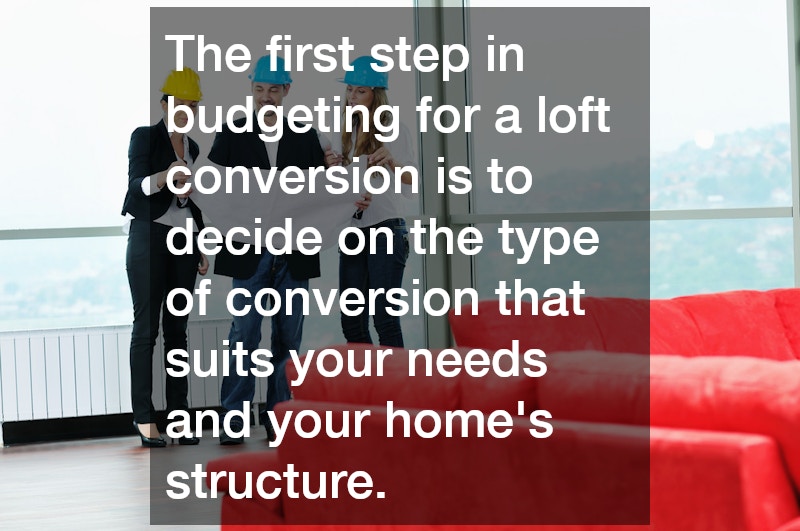Loft conversions are one of the most popular home improvement projects in the UK, and for good reason. They offer a great way to add valuable living space to your home, whether for an extra bedroom, office, or even a home gym. If you live in an area like South West London, where property prices are high and space is limited, a loft conversion can significantly increase the functionality of your home without the hassle of moving. However, one of the most important factors to consider before starting a loft conversion is your budget. Properly budgeting for loft conversions South West London is essential to ensure your project runs smoothly and within your financial limits.
In this blog, we’ll guide you through the key aspects to consider when budgeting for a loft conversion, helping you plan effectively and avoid unexpected costs.
1. Determine the Type of Loft Conversion
The first step in budgeting for a loft conversion is to decide on the type of conversion that suits your needs and your home’s structure. There are several types of loft conversions, and each comes with its own cost considerations:
Velux Conversion: This is the simplest and most cost-effective type of loft conversion, as it involves adding windows to the existing roof without altering its structure. It’s ideal for homes with plenty of headroom and typically costs less than other types of conversions.
Dormer Conversion: A dormer loft conversion involves extending the roof to create more headroom and usable floor space. It’s a popular choice in South West London, but it’s more expensive than a Velux conversion due to the additional construction work required.
Mansard Conversion: This is a more extensive loft conversion that involves altering the entire roof structure to create a flat roof with steep walls. Mansard conversions offer the most space but are also the most expensive option.
Hip-to-Gable Conversion: For homes with a sloping roof, a hip-to-gable conversion involves extending the gable end of the house to create more space. This type of conversion is more costly than a Velux or dormer conversion but can significantly increase the size of the loft.
The type of loft conversion you choose will have a significant impact on your budget. Basic Velux conversions can start at around £20,000, while more complex mansard or hip-to-gable conversions can cost upwards of £50,000. It’s essential to consult with professionals who specialize in loft conversions South West London to get accurate quotes based on your specific requirements.
2. Factor in Professional Fees
A successful loft conversion requires input from several professionals, including architects, structural engineers, and builders. Each of these experts will charge a fee for their services, so it’s important to include these costs in your budget.
Architect Fees: An architect will help design your loft conversion, ensuring that it meets your needs and complies with local building regulations. Depending on the complexity of the project, architect fees can range from 5% to 15% of the total project cost.
Structural Engineer Fees: A structural engineer will assess your home’s structure to ensure it can support the additional weight of the loft conversion. Their fees typically range from £500 to £2,000, depending on the complexity of the project.
Planning Permission and Building Regulations: Some loft conversions may require planning permission, especially if you’re altering the roof structure or your home is in a conservation area. Planning permission fees can vary, but they generally start at around £200. Building regulations approval is also required to ensure the loft conversion meets safety standards, and this can cost around £500 to £1,000.
By working with experienced professionals who specialize in loft conversions in South West London, you can ensure that all aspects of your project are handled properly and that you avoid any fines or penalties related to building regulations.
3. Construction and Materials
The cost of construction and materials will make up the bulk of your loft conversion budget. This includes everything from the actual building work to the materials used for flooring, insulation, windows, and roofing. The cost will vary depending on the size of the loft and the quality of materials you choose.
Labour Costs: The labour involved in a loft conversion includes everything from demolition (if necessary) to construction, roofing, plumbing, and electrical work. Labour costs in South West London are generally higher than in other parts of the UK, so be sure to factor this into your budget. A reputable building contractor will provide you with a detailed quote that includes all labour costs.
Materials: The materials you choose for your loft conversion will also impact the overall cost. Higher-end finishes such as hardwood flooring, premium windows, and custom built-in storage will drive up the price. Insulation, plastering, and roofing materials are also important cost factors.
It’s advisable to get multiple quotes from contractors who specialize in loft conversions in South West London to compare costs and ensure you’re getting a fair deal.
4. Additional Costs
In addition to the core costs of design, construction, and materials, there are several additional expenses to keep in mind when budgeting for a loft conversion.
Staircase Installation: A staircase is necessary to access your new loft space, and the cost of installing one can range from £1,500 to £5,000, depending on the design and materials.
Plumbing and Electrical Work: If your loft conversion includes a bathroom or needs additional electrical wiring, this will add to the overall cost. Installing a bathroom can cost anywhere from £3,000 to £8,000, depending on the fixtures and finishes you choose.
Finishing Touches: Once the major construction work is complete, you’ll need to budget for finishing touches such as painting, flooring, and furniture. These costs can add up, especially if you’re aiming for a high-end finish.
.

